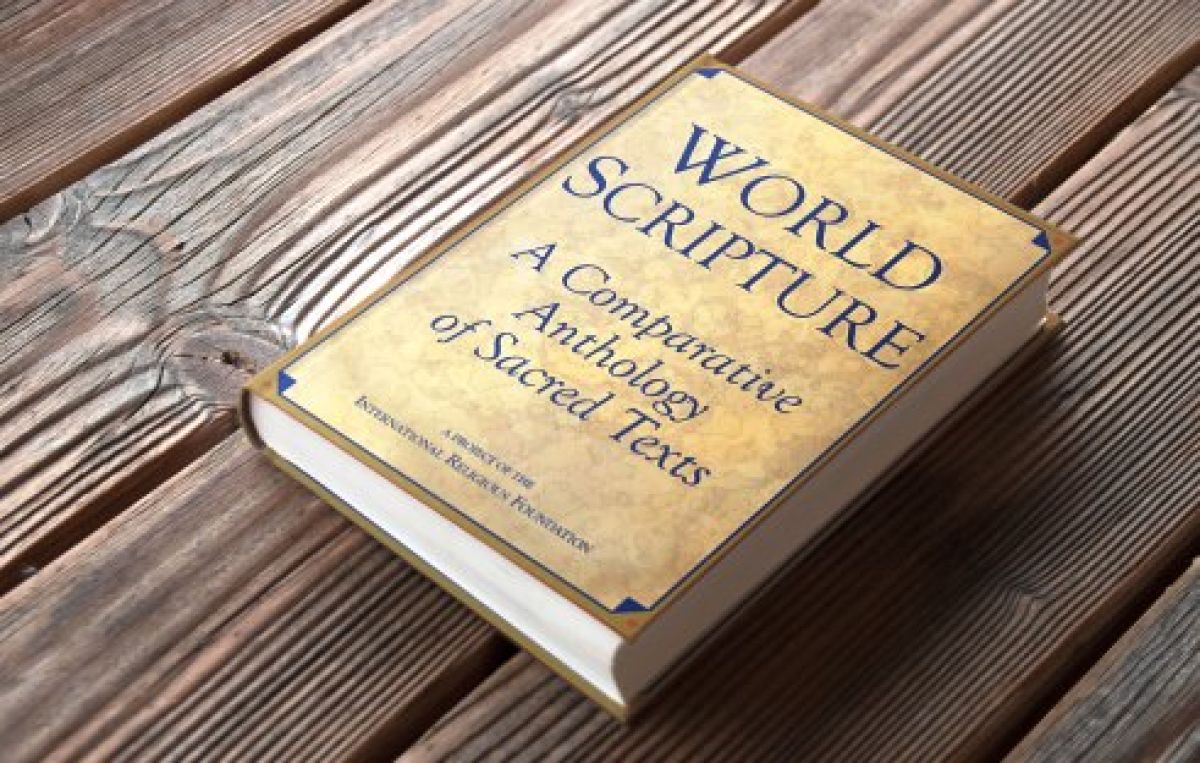World Scripture 25 years: What unites us…

25 years ago, the inaugural assembly of the Inter-Religious Federation of World Peace (IRFWP) on August 27, 1991 was highlighted with the unveiling of World Scripture: A Comparative Anthology of Sacred Texts. The anthology had been commissioned by UTS Co-founder, Rev. Sun Myung Moon at the first Assembly of the World’s Religions in 1985.
World Scripture is an extraordinary journey through the sacred writings of the world’s great religions. Organized by subject, the quotations, passages, and excerpts presented here provide readers with easy access to teachings on several hundred subjects, with quotes from different religious traditions. This unusual anthology provides a new, holistic approach to understanding religion stressing what unites us rather than what divides us. Among the religious texts represented are Judaism, Christianity, Islam, Buddhism, Taoism, Hinduism, Confucianism, Jainism, Sikhism, Baha’i, Church of Jesus Christ of the Latter Day Saints, and Zoroastrianism. Also featured are the oral traditions of various religions of Africa, Native America, Asia, and Oceania along with their recorded prayers and proverbs.
World Scripture was edited by Dr. Andrew Wilson (UTS’78), professor of Scriptural Studies at Unification Theological Seminary who devoted more than five years to this task. It contains over 4,000 passages gathered from 268 sacred texts and 55 oral traditions. Religions represented include Christianity, Judaism, Islam, Buddhism, Hinduism, Confucianism, Taoism, Jainism, Sikhism, Shinto, Zoroastrianism, the Baha’i Faith, the Church of Jesus Christ of Latter-day Saints, and the Unification movement, among others. Scriptural texts are gathered around 165 topics and concerns shared by most or all religions.
God’s absolute goal is one terminal point, but how in this world can we approach this goal? Unless every religion, and every political and economic realm, converge to one direction, we cannot make world peace. Therefore, I want to recommend this World Scripture, and encourage the making of similar books.”Rev. Dr. Sun Myung Moon, Co-founder of UTS
World Scripture was formally presented at the IRFWP assembly in Seoul on August 27, 1991. In his Founder’s Address, “Religion’s Mission for World Peace,” the Reverend Sun Myung Moon thanked the scholars and religious leaders who worked for the publication of World Scripture, and remarked on the volume’s significance:
“World Scripture will become a shining light, a volume of holy scripture that puts together the universally valuable contents of the world’s religions. In particular, it will become a precious textbook for educating the younger generation who are to live together as one global family. It will teach them to overcome barriers between religions, between races, and between cultures. I believe that, through this text, all people will not only free themselves from religious ignorance and self-righteousness, but also realize the fact that, among religions, there are shared values and a universal foundation which are of greater significance than the differences which have historically divided religions.”
Following the address, two copies of World Scripture were presented to Reverend and Mrs. Moon. Rev. Moon, beaming, held the volume over his head and looked out over the assembly and extemporaneously said:
“Why do we need such books as World Scripture? God’s original purpose for theology is to make for world peace, and the goal is one world under God. Now in this world there are many varieties of religious viewpoints, and likewise political and economic viewpoints. How can we combine all these into one direction? This is the problem. God’s absolute goal is one terminal point, but how in this world can we approach this goal? Unless every religion, and every political and economic realm, converge to one direction, we cannot make world peace. Therefore, I want to recommend this World Scripture, and encourage the making of similar books.”
In his essay, World Scripture and Education for Peace, Dr. Andrew Wilson affirmed that “World Scripture highlights the convergence and agreement among religions. There is no attempt to write a systematic treatise on the unity of religions according to some conceptual scheme if that is even possible. Rather, a wide variety of topics are laid out, and scriptures on that topic are presented wherever appropriate. Looking at the topics, we can see that the various religions concur on about eighty percent of them. Our conviction is this: instead of insisting on a religion’s uniqueness on the basis of the 20 percent where it differs from the others, let’s celebrate the common ground on the basis of the 80 percent which is shared. Commonly shared religious values can become public values, since they do not favor any one religion over others.”
Paragon House has sold 3415 hardcover copies (now out of print) and 21,894 paperbacks. The book is definitely considered a classic in comparative religion.





